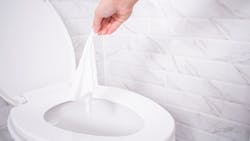U.S. legislators introduce legislation to address non-flushable wipes
U.S. Senators have introduced legislation that would address nationwide wastewater infrastructure concerns caused by the flushing of non-flushable wet wipes.
The Wastewater Infrastructure Pollution Prevention and Environmental Safety (WIPPES) Act was introduced by Oregon Senator Jeff Merkley, Maine Senator Susan Collins, and Representatives Mary Peltola (D-AK) and Lisa McClain (R-MI-09).
“When non-flushable wipes are sent through our sewage systems as a means of disposal, Oregon’s wastewater facilities face costly repairs and maintenance,” said Senator Merkley. “What’s more, these wipes are made of synthetic plastic fibers — they are not biodegradable — meaning these wipes break down into harmful microplastics. This bill is a necessary first step in making sure these products are accurately labeled so they can be appropriately disposed of, keeping our water clean and ensuring our wastewater infrastructure is safe and efficient.”
The WIPPES Act would address the flushing of non-flushable wet wipes. Many of these products are composed of manufactured plastic fibers or other strong fibers. While these products are not always marketed as flushable, consumers often assume that they are and frequently flush them into sewer systems as a means of disposal.
Due to their strong fibers, these types of wipes do not break down as they travel through the sewer systems. Instead, the wipes become magnets attracting fats, oils and grease and become obstructions in sewerage systems pipes that clog pumps, block sewer collection systems, and jam motors that lead to sewage backups and treatment equipment failures. They also contribute to the harmful proliferation of microplastics in water systems.
“Many consumers who use wet wipes are unaware that flushing these products creates significant problems for plumbing, wastewater treatment equipment, and septic systems,” said Senator Collins. “This legislation would require manufactures to label non-flushable wet wipes, providing consumers with the information they need to safely dispose of them. I urge my colleagues to support this commonsense legislation that will help prevent homeowners and taxpayers from having to pay for expensive repairs.”
The WIPPES Act would direct the Federal Trade Commission, in consultation with the Environmental Protection Agency (EPA), the Commissioner of Food and Drugs, and the Consumer Product Safety Commission (as appropriate depending on the type of covered product involved) to issue regulations on “Do Not Flush” labeling requirements for the covered products defined in the bill, which includes baby wipes, household wipes, disinfecting wipes or personal care wipes.
This legislation is cosponsored by Senators Angus King (I-ME), Jeanne Shaheen (D-NH), Ron Wyden (D-OR), Edward J. Markey (D-MA), Richard Blumenthal (D-CT), and Elizabeth Warren (D-MA).
The WIPPES Act is also endorsed by the National Association of Clean Water Agencies (NACWA), , California Association of Sanitation Agencies (CASA), Association of Nonwoven Fabrics Industry (INDA), Kimberly-Clark, Consumer Healthcare Products Association (CHPA), National Stewardship Action Council, Water Environment Federation, Procter & Gamble, and Oregon Association of Clean Water Agencies.
“Creating a uniform, national policy for labeling of ‘non-flushable’ wipes is critically important to protect sewer systems and household plumbing,” said Adam Krantz, CEO of the National Association of Clean Water Agencies (NACWA). “Personal care wipes, while convenient for the consumer, cause serious harm to municipal sewer systems across the nation when they are improperly flushed. The water sector worked hand-in-hand with industry on this commonsense legislation that will provide clarity for the consumer, protect sewer workers, and avoid millions in infrastructure damage nationwide."
